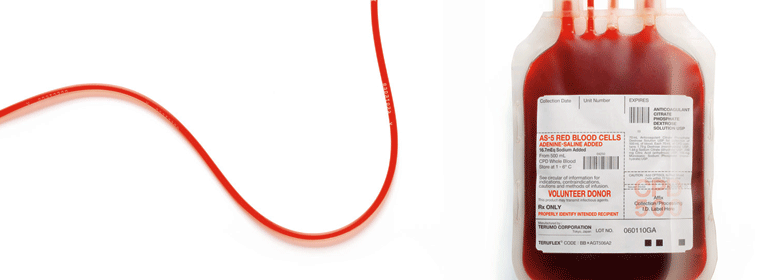Even though gay men actively discriminated against by the Irish Blood Transfusion Service blood ban, we should be encouraging other people to donate, says Rob Buchanan.
When I’m not being a mouthpiece for the Gay New World Order, I work in the offices of a large insurance company. I occasionally organise charity events to offset the horrible karma I accrue by being an insufferable gobshite at the weekends. One of these is a quarterly promotion to get the lads in work out to local blood drives in the area. I have family members who suffer from hemophilia and other blood disorders, so it’s a cause that’s close to my heart.
There’s usually a bit of a buzz in the office, people speaking with pride about how many pints they gave, about their unusual blood types or some expressing gratitude for how blood has been used to help a loved one in the past, or even themselves. If I stumble upon on of these conversations, I try to politely make myself scarce. Inevitably will get cornered in the lift or in the canteen and people will ask me “So are you donating, Rob?” And I’ll shamefully reply, “I can’t”.
Sometimes I’m not asked why I can’t donate blood. Maybe it’s wrongly assumed that I have some kind of contagious disease (you know the one, the one the gays get, cough, cough). Maybe it’s assumed that I’m afraid of needles, though I can honestly tell anyone who asks, I’ve had more pricks in me than a second-hand dartboard. But the frustrating and life endangering truth is: I cannot give blood because I have sex with men.
Men Who Have Sex With Men
I have rhesus negative O blood, which is a useful type. Yet regardless of what type I have, because I’m a shirt lifter, I’m unable roll up my sleeves in order to help my fellow man. MSM or ‘men who have sex with men’ are excluded from donating blood in Ireland due to what the authorities say is “not based on sexuality or orientation but on the fact that there are increased levels of HIV infection among men who have sex with men in Ireland”.
Recently the Danish Health Minister Nick Haekkerup called for the ban on MSM giving blood to be lifted in his own country, citing the need to increase the number of young male donors who generally have a higher blood percentage. As far back as 2010 Gay Doctors Ireland, and organisations of LGBT medical professionals also came forward and called the ban on gay men donating as unscientific and outdated.
One of the statistics used to show why the ban is unfair and unnecessary is that in 341 people were newly diagnosed with HIV in Ireland in 2012. 166 of those were classed as MSM, while 130 were heterosexual. It is quite possible that if heterosexual men sought STD testing as frequently as gay men, the identified numbers of straight men with HIV would be even higher.
But even with the figures as they are, we begin to see how unscientific the blood ban is. It creates a false idea of the proportional risk gay men pose to bloodstocks, whilst simultaneously reinforcing the notion in the Irish consciousness that there is still something innately unnatural and dangerous about sex between men.
Rigorous Process of Examination
The IBTS does not automatically assume that the blood they accept (i.e. straight people’s) is necessarily safe. All blood donations enter a rigorous process of examination. Firstly the donor’s blood type is identified, so it can be assigned. Unusual antigens and antibodies are also screened for. At this stage the blood is also analyzed for STDs using a high-sensitivity testing which doesn’t diagnose specific diseases or viruses. In fact the test is so rigorous, it often creates false positives. When an STD is detected in donated blood, the unit is classed as contaminated and destroyed.
Multi-testing can target a specific disease such as the HIV. If an antibody test doesn’t detect the virus in a recent donor, a P24 antigen or HIV nucleic acid test combined with the antibody test will do so. The argument regarding HIV having a particularly long incubation period, known as a Window Period, does not justify the permanent exclusion of perfectly healthy gay men from donating blood. The blanket ban seems more of an ideological statement than a valid medical precaution.
I understand the concerns of the IBTS. But I do question them. If it were a valid and proportionate measure, necessary to protect lives, then I wouldn’t care. Is the risk a reality? There is a risk, yes, but the risk is not so much different from that created by straight donors. Maybe a question we should be asking is: With blood stocks low in Ireland especially at peak times such as Christmas, are lives actually being put at risk due to an illogical that disqualifies a large and eager group of would-be donors?
Why I Don’t Lie
I could walk in to any blood donation clinic and lie. I could tick the straight box and give my blood. However, my personal convictions prevent me from lying. My conscience needs to find a compromise, where I can still make a gesture of donation without breaking the law. To reconcile this, I encourage and facilitate the donation of other people’s blood, so that much-needed stocks are replenished.
To other MSM reading this, I would ask you to consider doing the same. While we await the overturning of this discriminatory and unscientific prohibition, we can still be of vital help.
© 2014 GCN (Gay Community News). All rights reserved.
